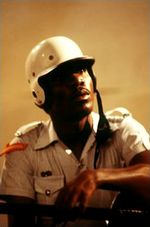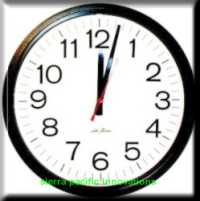Tyrannical Shoulds
 In recent blogs I have been hinting that a successful Move back to Jamaica is more than just a physical move, it is also a spiritual one.
In recent blogs I have been hinting that a successful Move back to Jamaica is more than just a physical move, it is also a spiritual one.Not religious necessarily, but spiritual. Moving Back successfully often entails a remarkable inner journey, in which one is confronted with personal barriers, obstacles and prejudices. The real story about Moving Back is not ultimately about how to pack a container, but how to thrive in an environment that is at times dangerous, depressing and dogmatic.
Given that most of the moves back home are from "better places," when the move is a voluntary one it marks a decision to take an action that goes against the prevailing wisdom.
"Yuh mad or what?" is expressed far more often than "Welcome home."
The reason to move home, and the choice to take the road less travelled are just the beginning of a long inner journey that starts with a personal decision, which reminds me of the U.S. Marines motto - ''The brave, the proud, the few."
While everyone should visit an army base at some point, not everyone should join the Marines. Everyone should visit Jamaica, but not everyone should come back to live.
For those who make the decision, however the instant it is made marks the beginning of an intense personal struggle involving one's own doubts, commitments, plus finding a way to navigate the ''helpful" comments of others. Of course, there are also the scary circumstances to deal with - the rampant breakdowns and the mind-numbing bureaucracies.
Obviously, the Jamaica that the returnee is coming home to is going to be a lot different than the country being left (otherwise, why return?) That goes without saying. For the vast majority of Jamaicans abroad, the difference is a negative one that prevents them from ever coming back.
The important question is: How does the returnee stay true to whatever original vision created the desire to return, as opposed to getting caught in the numerous mental potholes that exist?
In other words, are there ways for returnees to better equip themselves to take on the challenge of returning?
I have participated in a couple of courses that have nothing to do with emigrating, but everything to do with creating an inspiring vision and keeping it alive. I recommend them both as possible venues to start to be trained in dealing with the mental or personal challenges that seem to come alive whenever we humans try to take a quantum leap to better ourselves.
The first is a series of programs offered by Landmark Education. The second is based on a book called Loving What Is.
In a former life, I led public seminars as a volunteer for Landmark. The courses I lead followed their basic program called The Landmark Forum. Fortunately, The Forum is offered in Kingston twice a year, and in most major cities in the US, Europe and Asia.
Moore recently, I took a weekend course with Byron Katie, the author of Loving What Is.
Katie (as she is called) focuses her work on dealing with reality, and the thoughts we have about what is happening around us in our lives. Suffering, she says, comes from getting stuck in thoughts that weigh us down, preventing us from fully embracing what is happening at any moment.
When we are able to effectively question our thoughts is when (and only when) we can be free. From my experience, the most pernicious thoughts are those that have a heavy "should" component.
For example, here are the few that run through my head:
- Jamaica should not have so many murders
- The politicians should be serving the needs of the people
- The police should be less corrupt
- There needs to be less bureaucracy
- This could only happen in Jamaica
- De people dem too dyam tief
- Things are too expensive here
- It is way too hot / rainy / humid / dry
- De mosquito / madman / pothole / noise (dem) is unbearable
- Life here is too hard
- The US/UK/Canada is so much better because...
- De people too gravilishus / licky-licky/ wanga-gut/ nayga-like/ lazy / violent / aggressive / ungrateful / greedy etc.
At the heart of each of these thoughts is an unwillingness to accept reality, and a wanting life to be different. Nothing wrong with that... except when we refuse to fully accept life the way it is right now.
That sounds quite simple, and based in common sense, yet there is a powerful human mechanism at work here that takes serious practice to overcome. The vox populi in Jamaica is dominated by strident calls against "what should not be happening."
It is quite easy as a returnee to fall (or relax) into this general, disempowering tone.
Over the past 2 or so years of using Katie's materials (available free from her website) I can safely report that it has helped me tremendously. How? I have found that the moment any kind of anguish or suffering starts, I am now much better at nipping it in the bud using her simple formula - 4 questions and a turnaround statement.
I know expats, returnees and even Jamaicans who have never left who indulge themselves in endless rounds of "what is wrong with Jamaica." This perpetual game is one that prolongs their personal suffering, as new items are sought out daily to be added to a growing list.
Using Katie's tools, I find that I have been able to increase my capacity to remind myself (when I find myself indulging also) that ... Jamaica(ns) should not be any other way that is. Why? Because it is exactly the way that is, and no other.
It has taken me many hours, tens of pages and lots of study to begin to see some consistency of application - my own inner journey has been slow, and I am far from mastery. But this growth is important for us returnees, even critical, if we are to succeed in fulfilling our dreams of returning "in style."
We Jamaicans abroad talk a lot about "setting ourselves up" before returning - preferably with a fat bank account, a 2-story house, a source of foreign exchange and at least a 1-year old SUV.
We might be right about the preparation needed to thrive in Jamaica, but dead wrong in thinking that the things that need to be prepared are tangible. After all, a well-timed hurricane, theft and recession can undo all those kinds of safety nets.
Instead, the best kind of preparation might be the kind that quickens the inner journey, and shows up as a willingness to learn, an openness to new ideas in any area, a love of adventure, an ability to self-reflect and a courage to tell the truth. If our being away in "farrin" has been about getting "set up" with these things, then it would have been time well spent.
~~~~~~~~~~~~~~~~~~~~~~~~~~~~~~~~~~~~~~~~~~~~~~~~~~~~~~~~~~~~~~~~~~~~~~~~~~~~~~~~~~
Some quotes from Byron Katie
When you argue with reality, you lose -- but only always.
I am the perpetrator of my suffering -- but only all of it.
What is is. You don't get a vote. Haven't you noticed?
Reality is God, because it rules.
Labels: spirituality
Read more!















